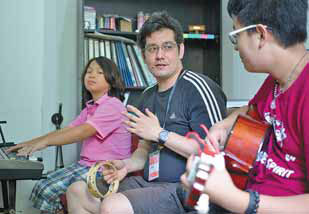 6 Chinese nurses win Florence Nightingale Medal
6 Chinese nurses win Florence Nightingale Medal
 23rd Qingdao Int'l Beer Festival closes
23rd Qingdao Int'l Beer Festival closes
 Tibetan ethnic costumes presented during tourism festival in NW China
Tibetan ethnic costumes presented during tourism festival in NW China
 Weekly selection of world photos (Aug.19-Aug.24)
Weekly selection of world photos (Aug.19-Aug.24)
 Summer jobs: A or B
Summer jobs: A or B
 Vintage cars exhibited at auto cultural festival in China's Shanxi
Vintage cars exhibited at auto cultural festival in China's Shanxi
 Military plane crashes in NE China
Military plane crashes in NE China
 Single mother, baby live in KFC restaurant for months
Single mother, baby live in KFC restaurant for months
 Those embarrassing copycat buildings
Those embarrassing copycat buildings
 |
| Jorg Rindermann practices with his students in Suzhou, Jiangsu province. (Gao Erqiang / China Daily) |
Many Chinese teen piano players hate music.
That's something German entrepreneur Jorg Rindermann hopes to change.
The rote learning used to pass the national piano grading examination kills their passion for piano, he says.
He recalls hearing a 16-year-old neighbor in Jiangsu province's Suzhou city practicing the same songs every day.
"As soon as these students pass the test, many of them are done with the piano. Some end up hating it," Rindermann says.
So, Rindermann quit his fine machinery job to found Raffles Music Class in 2009. The school teaches more than 100 students in eight classrooms in a residential community in Suzhou's hi-tech industrial park district.
Guitar and drums were recently added to the curriculum. Several advanced students have formed a band and cover such classics as Hey Jude and Rolling in the Deep.
"Music is for enjoyment," Rindermann says.
"It's more fun sharing music between members of the band."
Some parents brought their children to Raffles Music Class because their children were "unhappy and not making any progress in learning music".
Rindermann has reignited their passions.
The school also offers an expansion program. It encourages students to express their understanding of music through speech, drawing and dancing. For instance, teachers sometimes present music in sync with a cartoon to inspire emotional responses and stimulate imaginations.
It's a far cry from the typical disciplinary approach students use to score highly on the 10-level national piano exam. Many parents push their kids to get certification because they believe it gives them a competitive edge in life.
"They are deprived of the fun of music under the heavy pressure of the test," Rindermann says.
Rindermann tries to make music interesting. He doesn't encourage students to take the exam.
His school uses the British Associated Board Royale School of Music grading system.
"It examines not only the playing skills but also their understanding and perception of music," he says.
But some discipline is required for any music student, no matter how they're taught or graded.
Rindermann's students replace repetition with analyses of the melodies and rhythms to help students "collect the beat". If they can sing it, they can play it, he believes.
The 43-year-old became interested in music at age 5, when he received a toy marimba. He started a decade of piano lessons under an Indonesian teacher in Berlin the following year.
"My teacher didn't speak much German, but language was never a problem," he says. "Music is universal."
He studied economics in university but maintained his musical interests through his 2007 arrival in China.
"I would go up and play whenever I saw a piano," he says.
Rindermann played jazz piano in a Suzhou bar and won first prize in the 2011 Suzhou talent show for expatriates with a jazz adaptation of a Chinese pop song and a piano solo.
He's happy to be able to live his dream of working with music. Raffles Music Class charges 4,200 yuan ($687) a year. It's sustainable but not highly profitable, Rindermann says.
But he hopes to grow.
"I wish to expand the school to more cities of China, maybe Shanghai," he says.
"I also want to organize music tours for Chinese families to Germany to participate in all the music festivals there. I hope to bring the joy of music to more people in China."
 August Full Moon celebrated across Greece
August Full Moon celebrated across Greece Top 10 Chinese provinces for the well-heeled
Top 10 Chinese provinces for the well-heeled  Fan Bingbing poses for Malaysian magazine Citta Bella
Fan Bingbing poses for Malaysian magazine Citta Bella Preview of Moscow air show
Preview of Moscow air show Wild dream: Hell-like training for bodyguard
Wild dream: Hell-like training for bodyguard  Zhang Xinyi covers COSMOPOLITAN
Zhang Xinyi covers COSMOPOLITAN China’s weekly story
China’s weekly story  The story of a savior sibling
The story of a savior sibling A collection of bizarre rooftop buildings around China
A collection of bizarre rooftop buildings around China 100th birthday of 'Little Mermaid'
100th birthday of 'Little Mermaid' Escort taskforce holds live-fire training
Escort taskforce holds live-fire training Adorable! Marmots get along well with herdsmen
Adorable! Marmots get along well with herdsmen Nokia's Global Headquarters: visiting a declining empire
Nokia's Global Headquarters: visiting a declining empire 2013 Taiwan Int'l Tourism Expo kicks off in Taipei
2013 Taiwan Int'l Tourism Expo kicks off in Taipei Photo story: Take a gap year
Photo story: Take a gap yearDay|Week|Month